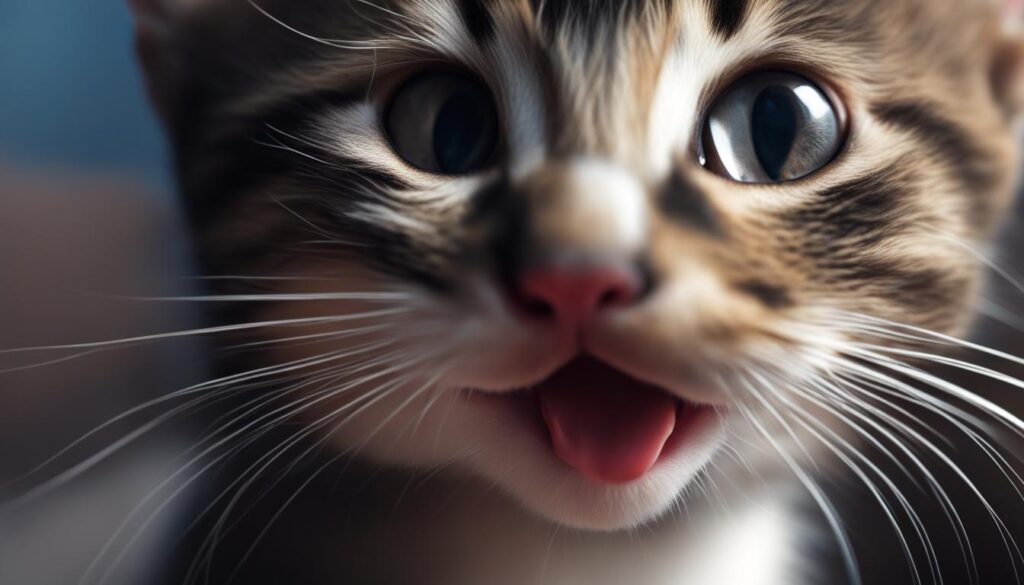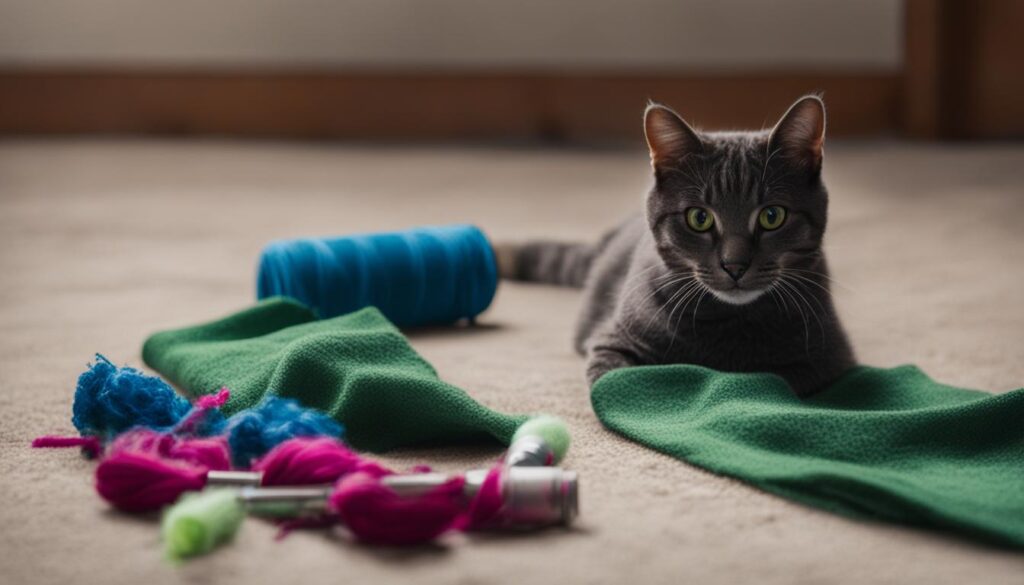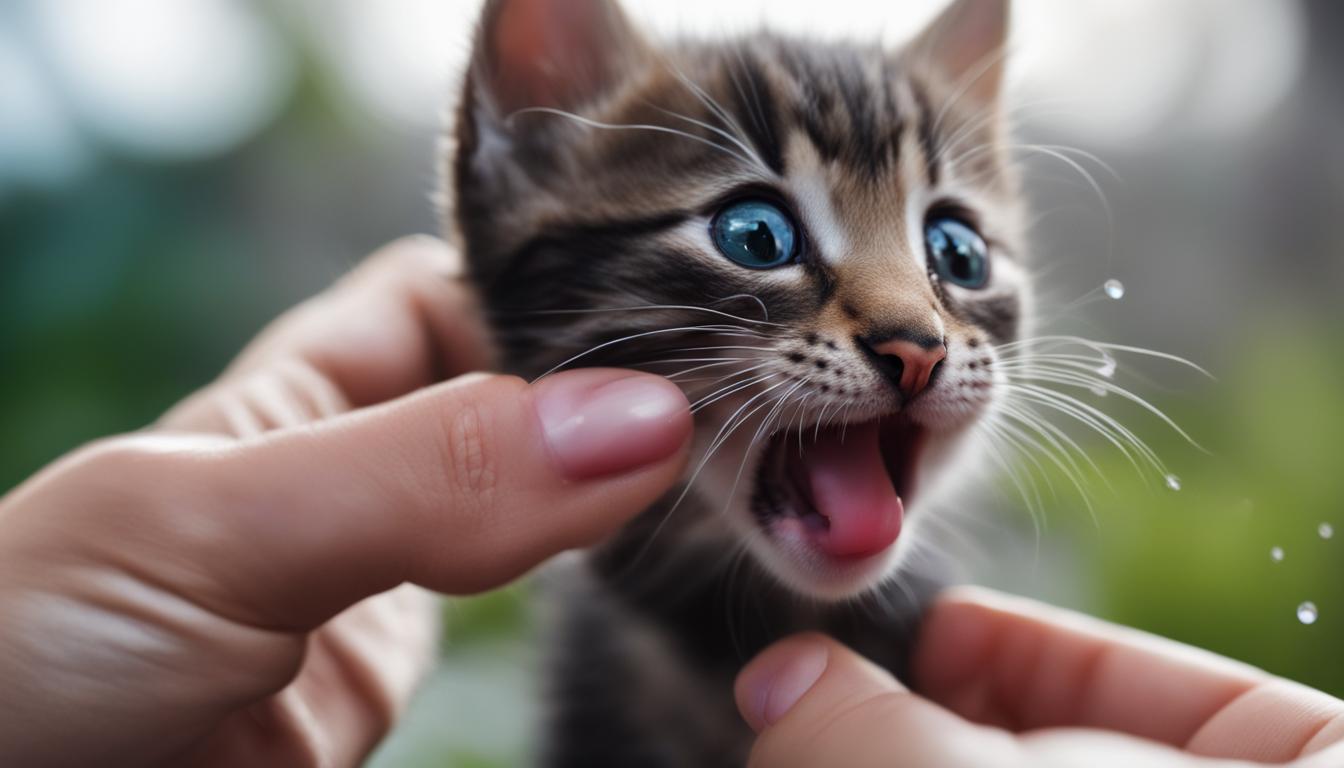Have you ever wondered why your adorable little kitten loves to shower you with wet, sandpaper-like licks? You’re not alone! In this informative guide, we’ll delve into the fascinating world of kitten licking behavior and explore the reasons behind this endearing yet puzzling phenomenon.
From showing affection to seeking attention, there are several possible explanations for why kittens lick their favorite humans. By understanding their behavior, you can deepen your bond with your furry friend and ensure their well-being. So let’s dive in and unravel the mysteries of why kittens can’t resist giving you those wet kisses!
- Is It Normal For Cats to Lick You?
- Why Do Cats Lick You?
- Is It Safe to Let Your Cat Lick You?
- Why Does My Cat Lick Me So Much?
- Why Does My Cat Lick and Then Bite Me?
- How Can I Make My Cat Stop Licking Me?
- When Should I be Concerned About My Cat's Licking?
- Should I Stop My Cat From Licking Me?
- Conclusion
- FAQ
- Source Links
Key Takeaways:
- Kittens lick their humans to express affection, seek attention, and identify them as part of their social group.
- Licking is a normal behavior for cats, with up to 8% of their waking time spent grooming.
- Letting your kitten lick you is generally safe, but precautions should be taken to avoid potential risks, such as transferring bacteria or exposing them to harmful substances.
- Excessive licking may indicate stress, boredom, pain, or medical issues, and should be addressed accordingly.
- If you find your cat’s licking uncomfortable or bothersome, there are strategies to minimize the behavior without damaging your bond with your cat.
Is It Normal For Cats to Lick You?
Cats spend a significant amount of time grooming themselves, and licking is a normal behavior for cats. They use their rough tongues with tiny barbs called papillae to remove dirt and debris from their coats. It is estimated that cats spend up to 8% of their waking time grooming.
Licking is an essential part of a cat’s grooming routine as it helps keep their fur clean, removes loose fur, and spreads saliva on their coat to keep them cool. This grooming behavior is instinctual and necessary for a cat’s overall health and well-being. Therefore, it is considered normal for cats to lick people.
Table: Cat Grooming Behavior
| Grooming Behavior | Description |
|---|---|
| Licking | Cats use their rough tongues to clean their fur, remove debris, and cool themselves. |
| Nibbling | Some cats may nibble or gently bite their fur to remove knots or tangles. |
| Scratching | Cats scratch to remove dead skin cells, stretch their muscles, and maintain their claws. |
| Grooming Others | Cats may groom other cats as a sign of affection and social bonding. |
Understanding and appreciating a cat’s natural grooming behavior can help foster a stronger bond between you and your feline companion.
Why Do Cats Lick You?
Despite extensive research, scientists have not fully determined why cats lick people. However, there are several possible theories. Cats may lick their owners as a way to express affection and strengthen their social bond. This behavior is similar to how mothers groom their kittens and how cats groom each other, known as allogrooming. Cats may also lick people to seek attention, identify them as part of their social group, display kitten-related behavior, investigate interesting scents or tastes, relieve anxiety, or indicate a medical issue.
While the exact reasons behind cat licking may remain a mystery, it is important to understand that licking is often seen as an affectionate behavior. When your cat licks you, it is a way for them to show that they care about you and consider you part of their family. It is their way of communicating and strengthening the bond between you. So, the next time your cat gives you a few licks, remember that it is their way of expressing their love and trust.
Understanding Allogrooming
One possible explanation for why cats lick their owners is the concept of allogrooming. Allogrooming is a behavior commonly observed among cats, where they groom each other as a way to bond and show mutual care. When your cat licks you, it may be their way of extending this behavior to include you as part of their social group. It is a sign that they see you as someone they trust and consider important in their lives.
While cat licking can be seen as an affectionate behavior, it is essential to note that excessive licking or changes in your cat’s licking behavior may indicate an underlying issue. If you notice any unusual or concerning behavior in your cat’s licking habits, it is advisable to consult with a veterinarian to rule out any medical or behavioral problems.

Summary
- Cats lick their owners for various reasons, including expressing affection, seeking attention, and displaying social bonding.
- Licking is a way for cats to communicate and strengthen the bond with their owners.
- Allogrooming, a behavior where cats groom each other, may play a role in why cats lick their owners.
- Excessive or unusual licking behavior should be carefully monitored and discussed with a veterinarian if necessary.
Is It Safe to Let Your Cat Lick You?
While allowing your cat to lick you is generally safe and can be a sign of affection, there are potential risks to consider. Cats’ mouths carry bacteria that can lead to infection if they lick an open wound. It’s important to be cautious and not let your cat lick your face or any cuts on your skin. This is especially important for individuals with weakened immune systems who may be more susceptible to infections.
In addition to bacterial risks, certain lotions or ointments applied to your skin may be harmful if licked by your cat. It’s essential to be mindful of the products you use and ensure they are safe for your cat to come into contact with. If you’re unsure, it’s best to consult with your veterinarian.
To minimize any potential risks, basic hygiene practices can be followed. Washing your hands after your cat has licked them can help reduce the likelihood of spreading bacteria. If you have any concerns about your cat’s licking behavior or if you’re unsure about the safety of certain substances, it’s recommended to seek guidance from a veterinary professional.
| Risks | Precautions |
|---|---|
| Bacterial infection | Avoid letting your cat lick open wounds or your face |
| Harmful substances | Be cautious with lotions or ointments applied to your skin |
| Basic hygiene | Wash your hands after your cat has licked them |
By taking these precautions, you can still enjoy the bonding experience of letting your cat lick you while minimizing potential risks to both you and your feline companion.
Why Does My Cat Lick Me So Much?
If your cat constantly licks you, it may be displaying excessive licking behavior. There can be several reasons why cats exhibit this behavior:
- Stress or anxiety: Cats may engage in excessive licking as a way to cope with stress or anxiety. This behavior can be triggered by changes in their environment, such as moving or the introduction of a new pet.
- Boredom or lack of stimulation: If your cat is not adequately mentally or physically stimulated, it may resort to excessive licking as a way to alleviate boredom.
- Medical issues: Excessive licking can also be a sign of an underlying medical condition. It is important to rule out any potential health problems, such as allergies, skin infections, or pain.
- Attention-seeking behavior: Some cats may lick excessively to gain attention from their owners. If they receive attention or rewards for this behavior, it can reinforce the licking habit.
To determine the cause of your cat’s excessive licking, it is essential to observe their behavior, consult with a veterinarian, and rule out any potential medical issues. Creating a stimulating environment, providing interactive toys, and engaging in regular play sessions can help reduce boredom and anxiety. Additionally, establishing a consistent routine and providing positive reinforcement for desired behaviors can help redirect their attention and discourage excessive licking.
Remember, excessive licking can sometimes lead to over-grooming, causing skin irritation or bald patches. If you notice any signs of skin problems or discomfort, it is crucial to seek veterinary care.
| Possible Reasons for Excessive Cat Licking |
|---|
| Stress or anxiety |
| Boredom or lack of stimulation |
| Medical issues |
| Attention-seeking behavior |

Why Does My Cat Lick and Then Bite Me?
If you’ve experienced the peculiar behavior of your cat licking you and then biting, you may be wondering what’s behind this affectionate but sometimes aggressive display. This behavior can have various reasons, and understanding them can help you manage and redirect it effectively.
One possible explanation for your cat’s licking and biting behavior is that it sees biting as a part of play. Cats often engage in play behaviors that involve stalking, pouncing, and biting. When your cat starts biting after licking you, it may be indicating its desire for more interactive play. Keeping this in mind, it’s important to provide appropriate outlets for play, such as interactive toys and structured play sessions, to redirect this behavior and prevent any accidental bites.
Another reason for your cat’s licking and biting behavior could be its way of communicating that it wants to stop being petted. Cats have their preferences when it comes to physical contact, and they may use biting as a signal to let you know they’ve had enough. Pay attention to your cat’s body language and respect their boundaries. If you notice signs of agitation or discomfort, it’s best to stop petting them and give them space.
“If your cat’s licking and biting behavior becomes too problematic, seek guidance from a veterinarian or professional animal behaviorist.”
It’s worth noting that every cat is different, and their individual personalities and experiences can influence their behavior. If your cat consistently exhibits aggressive biting behavior after licking, it’s important to understand their unique needs and provide appropriate outlets for their energy and stimulation. Regular play sessions, environmental enrichment, and positive reinforcement training can help redirect their behavior and promote a healthier, more balanced interaction with you.
| Reasons for Cat Licking and Biting Behavior | How to Manage and Redirect the Behavior |
|---|---|
| Play behavior | Provide interactive toys and structured play sessions |
| Communication to stop being petted | Pay attention to body language and respect boundaries |
| Individual cat personality and experiences | Regular play sessions, environmental enrichment, and training |
Remember, if your cat’s licking and biting behavior becomes too problematic or if you’re unsure how to address it, it’s always a good idea to seek guidance from a veterinarian or professional animal behaviorist. They can assess the situation, provide personalized advice, and help you create a plan to manage the behavior effectively while ensuring the well-being of both you and your feline companion.

How Can I Make My Cat Stop Licking Me?
If you find your cat’s licking uncomfortable or annoying, there are several strategies you can try to minimize the behavior. It is important not to use punishment, as this can damage your bond with your cat and increase their anxiety. Instead, you can consider the following ways to discourage cat licking:
1. Cover your skin
When interacting with your cat, you can cover your skin with long-sleeved clothing or a small towel. This physical barrier can help prevent direct contact between your cat’s tongue and your skin, reducing the urge to lick.
2. Redirect their licking
Provide your cat with an alternative outlet for their licking behavior. Offer a toy or treat that they can lick instead of you. This can help distract and redirect their attention away from licking you.
3. Ignore the licking
While it’s important to give your cat attention and affection, you can choose to ignore the licking behavior while still providing other forms of interaction. This way, you are not reinforcing the licking and teaching your cat that there are other ways to engage with you.
4. Provide environmental enrichment
Make sure your cat has plenty of mental and physical stimulation to keep them occupied. Engage in interactive play sessions, provide scratching posts, puzzle toys, and other enrichment activities. A stimulated cat may be less inclined to engage in excessive licking.
Remember, every cat is unique, and what works for one may not work for another. It may take some trial and error to find the most effective way to discourage your cat from licking you. If the licking behavior persists or becomes excessive, it’s always a good idea to consult with your veterinarian for further guidance. They can help determine if there are any underlying medical issues or provide additional strategies to address the behavior.

When Should I be Concerned About My Cat’s Licking?
If your cat’s licking behavior becomes excessive or problematic, it may be a cause for concern. While occasional and moderate licking is usually normal, certain situations warrant attention. Excessive licking that leads to over-grooming and results in bald patches or skin irritation could indicate an underlying medical issue or emotional disorder. Additionally, if your cat suddenly starts licking excessively, it may be a sign of pain, discomfort, or stress.
It is important to monitor your cat’s behavior and look out for any changes or patterns in their licking habits. If you notice any concerning symptoms or if the licking persists, it is recommended to consult with your veterinarian. They can conduct a thorough examination and determine if there are any underlying health issues causing the excessive licking.
| Medical Issues Causing Cat Licking | Symptoms |
|---|---|
| Skin allergies or irritations | Redness, swelling, itching |
| Pain or discomfort | Whining, limping, sensitivity to touch |
| Anxiety or stress | Excessive vocalization, hiding, changes in appetite |
| Feline hyperesthesia syndrome | Excessive grooming, twitching, aggression |
| Urinary tract infection | Increased frequency of urination, blood in urine |
Remember, it is always better to err on the side of caution when it comes to your cat’s health. Your veterinarian can provide the necessary guidance and recommend appropriate treatments or interventions to address the underlying cause of the excessive licking.
Should I Stop My Cat From Licking Me?
Allowing your cat to lick you can be a personal choice, influenced by your preferences and circumstances. There are both pros and cons to consider when deciding whether or not to let your cat engage in this behavior. Here are some factors to keep in mind:
- Pros of Allowing Cat Licking: Letting your cat lick you can strengthen your bond and provide a sense of affection. It can be a way for your cat to show love and trust, similar to how they groom their feline companions.
- Cons of Allowing Cat Licking: Excessive licking can be uncomfortable or irritating, especially if your cat has rough or abrasive tongue. There is also a risk of potential infection if your cat licks an open wound or if you have a weakened immune system.
- Managing Cat Licking Behavior: If you decide to allow your cat to lick you, it’s important to establish boundaries. Redirect the licking to a toy or treat, and provide alternative outlets for grooming and licking. You can also cover your skin with long-sleeved clothing or a small towel to minimize direct contact.
In summary, whether or not you should stop your cat from licking you depends on your personal comfort and the specific circumstances. If the behavior is enjoyable and does not pose any risks or issues, it can be a positive way to bond with your feline companion. However, if the licking becomes excessive, uncomfortable, or poses any risks, it may be necessary to manage and discourage the behavior using positive reinforcement techniques and environmental enrichment.
Conclusion
In conclusion, understanding your cat’s licking behavior is crucial for building a strong bond with your furry friend. Cats lick as a way to show affection, seek attention, or communicate their needs. While allowing your cat to lick you is generally safe, it’s important to take precautions to avoid potential infections or exposure to harmful substances.
Bonding with your cat through gentle interactions and positive reinforcement can enhance your relationship. However, if your cat’s licking becomes excessive or uncomfortable, there are strategies to manage the behavior. Providing alternative outlets for licking, such as interactive toys or treats, can redirect their attention.
Managing your cat’s behavior also involves environmental enrichment, mental stimulation, and understanding their body language. By monitoring your cat’s licking habits and seeking professional advice when necessary, you can ensure their well-being and maintain a harmonious relationship.
FAQ
Is it normal for cats to lick you?
Yes, it is normal for cats to lick people. Cats spend a significant amount of time grooming themselves, and licking is a normal behavior for them.
Why do cats lick people?
Cats may lick people for various reasons, including expressing affection, seeking attention, identifying them as part of their social group, displaying kitten-related behavior, liking their taste, showing anxiety, or indicating a medical issue.
Is it safe to let my cat lick me?
Generally, it is safe to let your cat lick you, but precautions should be taken to avoid transferring bacteria or exposing them to harmful substances. It is advisable not to let your cat lick your face or any cuts on your skin, and basic hygiene practices should be followed.
Why does my cat lick me so much?
Excessive cat licking can occur due to various reasons, such as stress, boredom, anxiety, changes in the environment, pain, medical conditions, or a desire for attention. Identifying the underlying cause is important in reducing excessive licking.
Why does my cat lick me and then bite me?
Cats may lick and then bite their owners for several reasons, including play behavior, communication to stop being petted, or a desire for more interactive play. Understanding your cat’s body language and providing appropriate outlets for play can help redirect this behavior.
How can I make my cat stop licking me?
There are several strategies you can try to minimize cat licking behavior, such as covering your skin, redirecting their licking to toys or treats, ignoring the licking while still giving attention in other ways, and providing environmental enrichment. Punishment should not be used.
When should I be concerned about my cat’s licking?
If your cat’s licking is excessive, leading to bald patches or skin irritation, it could indicate an underlying medical issue or emotional disorder. New or sudden onset of excessive licking should also be addressed by a veterinarian.
Should I stop my cat from licking me?
Whether or not you should stop your cat from licking you depends on your personal preferences and circumstances. If the licking is comfortable and does not pose any issues, letting your cat lick you can strengthen your bond. However, if it becomes excessive, uncomfortable, or poses any risks, it may be necessary to discourage the behavior using positive reinforcement and providing alternative outlets for licking and grooming.
Can cat licking be harmful?
While occasional and moderate licking is usually harmless, there are certain situations when you should be concerned. If your cat’s licking is accompanied by over-grooming, leading to bald patches or skin irritation, it could indicate an underlying medical issue or emotional disorder. Monitoring your cat’s behavior and seeking professional advice if needed is important.




